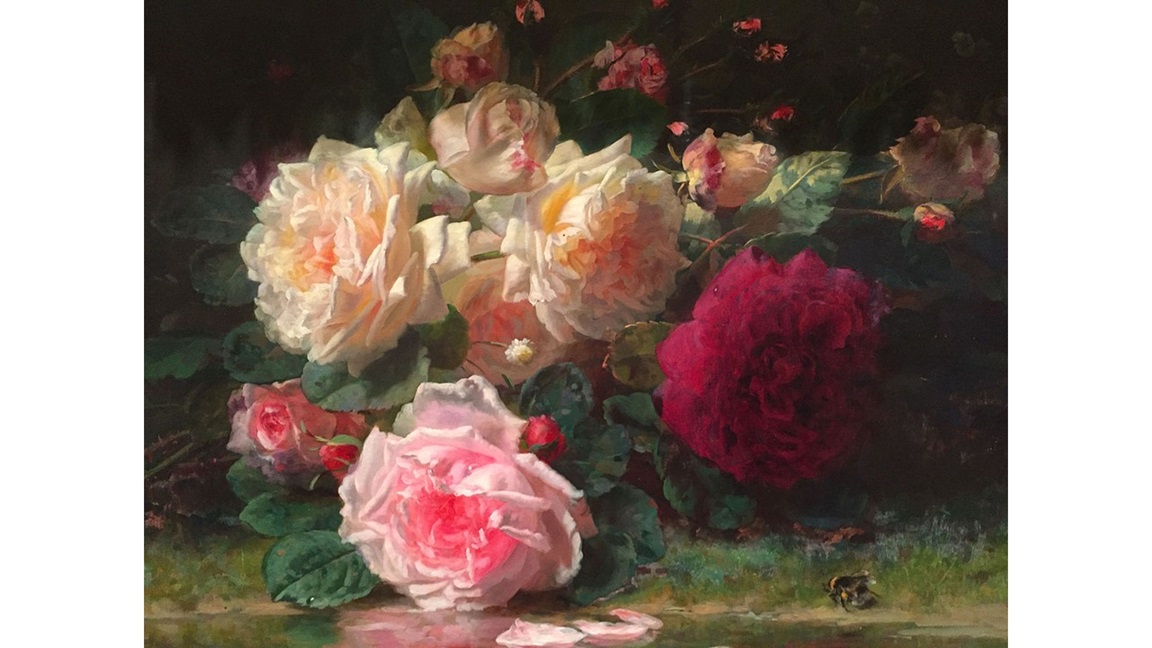The fire waits with tiger paws
on silent haunches by the hill,
then mounts the rock with clinging claws,
and contemplates the moment it will
pounce—on sagebrush dry as bones,
under a ghostly quiet moon,
slink through tinder, stalking homes,
and spring atop a shingled roof.
In blazing orange black white cape
it roars at scorching desert sky,
dives on prey, devours the take,
smoldering embers in its eye.
We scan the canyons, fear the sight
of fire—the tiger in the night.
Sally Sandler is a writer and graduate of the University of Michigan. She lives in San Diego, California.

















I like the execution of this very much – a tetrameter sonnet with some lovely mimetic touches: especially the stanza/line break where ‘pounce’ leaps away from its sentence, enacting the movement of the ‘tiger’ as our eyes jump forward. Very impressive work.
Thank you James!
Sally Sandler
Love this, Sally. Descriptive, with its zinger at the end!
Thank you, Carole!
Sally Sandler
I also love this poem. Whether intentional or not, the irregular metrics create a flickering effect, as if tiger-tongues of flame are nibbling at the edges of the verse. Curiously, to my ear at least, the poem is most effective when read out loud when it morphs into what it sounds like a successful, hybrid crossover between formal and free verse (a la Eliot). The sonnet structure adds emphasis to the drama of the closing couplet. This poem demonstrates that bending the “rules” a little can sometimes be a good thing!
Actually, there is only one instance of metrical irregularity in this poem, and it is in the fourth line. Every other line scans as a recognizable tetrameter. This suggests to me that line four is an error, not an intentional attempt to add irregularity to the poem.
I’d suggest a revision of line four, perhaps in this manner:
/and contemplates the time it will/
When you have a single metrical glitch in an otherwise perfect poem, it stands out like a wart.
By irregular metrics I was referring to lines 5, 7, 11, and 12 which lack the weak iambic opening found elsewhere, and also the extra syllable in line 12. My point was that these variations enhanced the poem, which is why I did not feel the need to be specific in making reference to them.
Thank you, James, that means much to me!
Sally Sandler
Thank you for taking the time to respond. It means much to me, as I’m sure you appreciate!
Thank you, I’m thrilled to anywhere near the mention of Eliot. I appreciate your response!
“slink through tinder, stalking homes,
and spring atop a shingled roof.
In blazing orange black white cape.”
I love these lines. They are so simple and yet so evocative.
I never realized how close a fire resembles a tiger.
Both are deadly and vicious but also bright, sleek and graceful.
This is very original.
Thank you for sharing!
Thank you for your response!
haunches / hills
slink / tinder
spring / shingle
blazing / black
roars / scorching
scan / canyons
fire / tiger
I don’t know if this qualifies as “fearful symmetry” (William Blake),
but you’ve got something going here.
The poem’s sensibilities, for me, seem rooted in the essence of native lore. Arrestingly visual. An almost picture book quality– though not necessarily so “kid-friendly.” Many vivid verbs as well!
Strangely, perhaps, it also brings to my mind Kipling’s “The Jungle Book.”
Thank you for this poem.
I’m happy anywhere in the vicinity of Kipling … thank you so much!
Yes! It is great symmetry! Great imagery and wordplay.
Thank you, James!
Sally Sandler
You have created the a vivid and lifelike picture, particularly, through your choice of verbs. I really liked the striking effect of the three colors, ‘orange black white’, in succession.
I agree with the suggested simple revision to line four, as this was also my thought on first reading your poem. Thank you for this evocative piece.
Great poem! It’s a pleasure to read.
Sally, Hello.
1. Lines 1 & 2 read as follows:
The fire waits with tiger paws
on silent haunches by the hill,
When I read these lines, I thought of “Fog” by Carl Sandburg, which reads as follows:
The fog comes
on little cat feet.
It sits looking
over harbor and city
on silent haunches
and then moves on.
So you are in good company.
2. Line 1 and line 14 both have the word “Fire.” If one were to read each of these lines as having four iambic feet, “fire” in Line 1 would need to have two syllables, and “fire” in line 14 would need to have one syllable. When I read the poem out loud, I actually do say “fire” with two syllables in line 1, and with one syllable in line 14. So it seems to work as is.
3. Regarding line 4, I agree with Dr. Salemi’s comment about the meter and support his proposed fix.
4. Line 5 reads as follows:
under a ghostly quiet moon,
I wonder if the moon could be “aloof” instead of “quiet.” That would give you a true rhyme with “roof.” Here are a couple ideas:
under a moon still and aloof,
under a moon hushed and aloof,
Other possible rhyme words include “fireproof” and “reproof.” Here’s one possibility:
pounce—on sagebrush dry as bones,
immune to hindrance or reproof,
slink through tinder, stalking homes,
and spring atop a shingled roof.
5. Line 9 reads as follows:
In blazing orange black white cape
The meter is off for me in this line, but it’s because I pronounce “orange” as “ornge,” i.e., as a one-syllable word. Since no one else mentioned this, perhaps you and they pronounce it with two syllables.
6. Almost every line has an article (a, an or the) before the noun. Lines 9 and 10 do not. Line 9 has “in… cape” and line 10 has “at… sky.” Leaving out the article sometimes makes a line sound awkward to me, but I may be in the minority on this.
7. The sonics of the poem are awesome. Alan provides many examples, and I’ll add “clinging claws.”
8. The strong verbs and colorful adjectives make this a fun poem. I like it.
4. Good input this.
And the rest, but particularly this.
Mark, I also read orange as one syllable but looked it up and found it does, indeed, have two. Language can be quite bendy at times, as you pointed out with the word “fire.” And what reads perfectly well for a person in India, the UK or Australia, can seem out of kilter to a West Coast Yank like myself.
My sudden shock, James, is in the fact that you had to “look up” the word ‘orange’ to verify that it’s got two syllables . . you could’ve verified that just by pausing for a moment and saying the word slowly and clearly to yourself.
Language can not “be quite bendy at times”: it can only be ‘bended’ . . bended by humans in their sloppy attempts to gain a non-existent syllable when convenience dictates; perfectly exemplified in the fact that some authors will think nothing of expecting a reader to wrongly pronounce the word ‘fire’ as ‘fie-yer’. Therein lies ‘language-bending’ in its purest form . .
Sally, Hi. I just thought of another option for line 6:
averse to hindrance or reproof,
The word “averse” reinforces the notion that the fire is alive and has a mind of its own, I think.
Hi Sally, I read the poem for my wife and we both really enjoyed it. Thank you!
Sally, YOU are the tiger burning bright. Your poem set my mind ablaze. I wish I knew how to use metaphor and image so effectively. Shine on, Tiger Moon! And come back soon. Joe Salemi’s comment is the one you should pay most attention to. He has guided me in the past, and he’s never led me astray.
For me, this is the perfect example of “one rhyme doesn’t? Big deal!”
Terrific poem – very well done!
So descriptive, I could almost feel the flames. I really enjoyed reading this – more than once 🙂